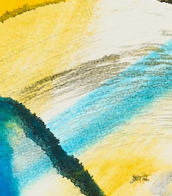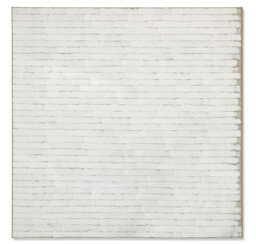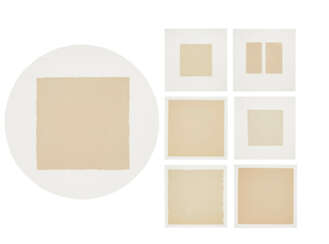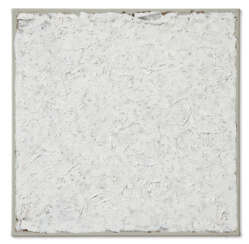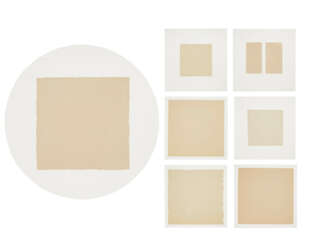роберт риман (1930 - 2019)
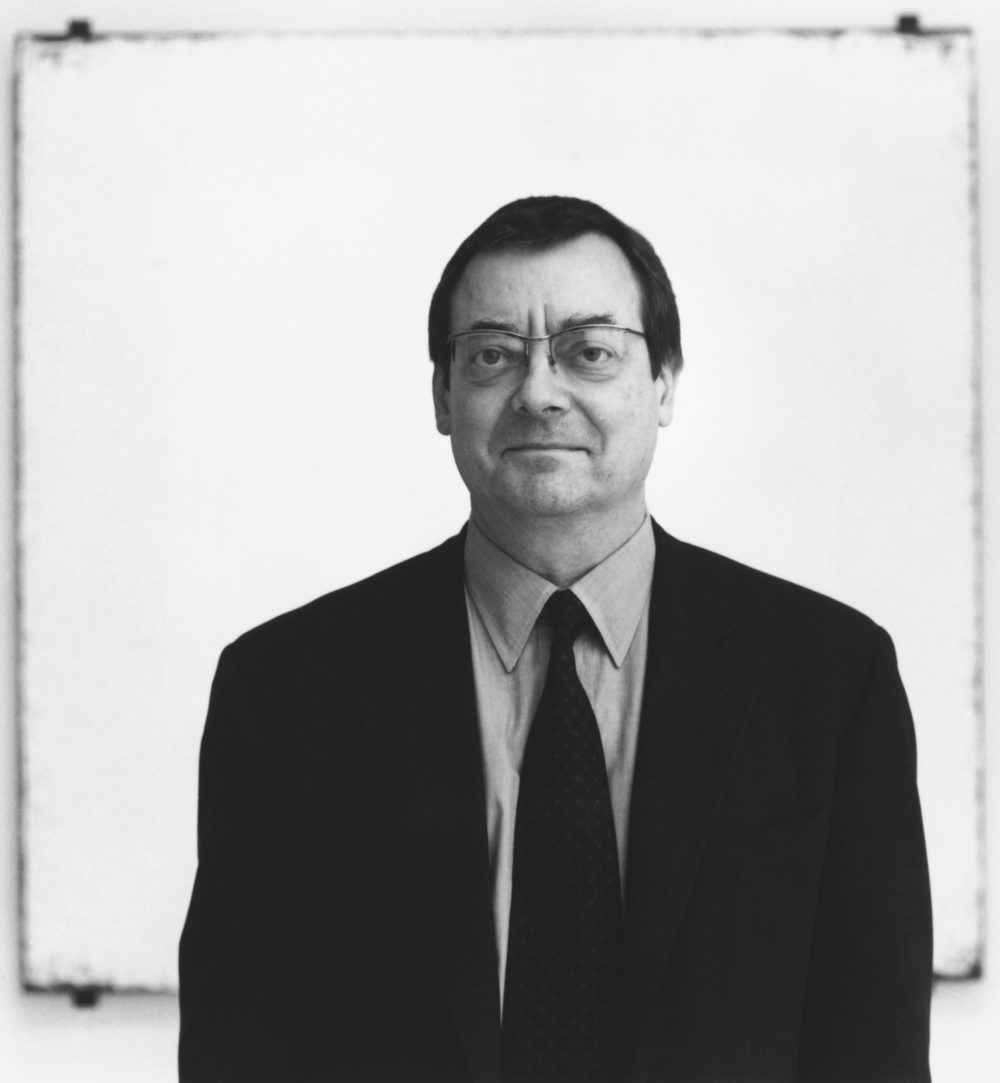
Robert Ryman was an American painter born in Nashville, Tennessee in 1930, and died in New York City in 2019. He was associated with the Minimalist movement, and is known for his monochromatic paintings that explore the materiality and texture of paint.
Ryman studied at the Tennessee Polytechnic Institute and the George Peabody College for Teachers before moving to New York City in the 1950s. He worked as a guard at the Museum of Modern Art, where he was exposed to the work of artists such as Jackson Pollock and Mark Rothko.
Ryman's early works were influenced by Abstract Expressionism, but he gradually moved towards a more minimal and reductive style. His paintings often feature white or off-white paint on square or rectangular canvases, with variations in texture and surface quality.
Ryman's work has been exhibited in galleries and museums around the world, including the Museum of Modern Art in New York, the Tate Modern in London, and the Centre Georges Pompidou in Paris. He was awarded the Golden Lion at the Venice Biennale in 2001, and is considered one of the most important American painters of the 20th century.
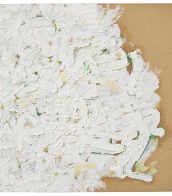

Robert Ryman was an American painter born in Nashville, Tennessee in 1930, and died in New York City in 2019. He was associated with the Minimalist movement, and is known for his monochromatic paintings that explore the materiality and texture of paint.
Ryman studied at the Tennessee Polytechnic Institute and the George Peabody College for Teachers before moving to New York City in the 1950s. He worked as a guard at the Museum of Modern Art, where he was exposed to the work of artists such as Jackson Pollock and Mark Rothko.
Ryman's early works were influenced by Abstract Expressionism, but he gradually moved towards a more minimal and reductive style. His paintings often feature white or off-white paint on square or rectangular canvases, with variations in texture and surface quality.
Ryman's work has been exhibited in galleries and museums around the world, including the Museum of Modern Art in New York, the Tate Modern in London, and the Centre Georges Pompidou in Paris. He was awarded the Golden Lion at the Venice Biennale in 2001, and is considered one of the most important American painters of the 20th century.


Robert Ryman was an American painter born in Nashville, Tennessee in 1930, and died in New York City in 2019. He was associated with the Minimalist movement, and is known for his monochromatic paintings that explore the materiality and texture of paint.
Ryman studied at the Tennessee Polytechnic Institute and the George Peabody College for Teachers before moving to New York City in the 1950s. He worked as a guard at the Museum of Modern Art, where he was exposed to the work of artists such as Jackson Pollock and Mark Rothko.
Ryman's early works were influenced by Abstract Expressionism, but he gradually moved towards a more minimal and reductive style. His paintings often feature white or off-white paint on square or rectangular canvases, with variations in texture and surface quality.
Ryman's work has been exhibited in galleries and museums around the world, including the Museum of Modern Art in New York, the Tate Modern in London, and the Centre Georges Pompidou in Paris. He was awarded the Golden Lion at the Venice Biennale in 2001, and is considered one of the most important American painters of the 20th century.
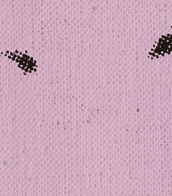

Robert Ryman was an American painter born in Nashville, Tennessee in 1930, and died in New York City in 2019. He was associated with the Minimalist movement, and is known for his monochromatic paintings that explore the materiality and texture of paint.
Ryman studied at the Tennessee Polytechnic Institute and the George Peabody College for Teachers before moving to New York City in the 1950s. He worked as a guard at the Museum of Modern Art, where he was exposed to the work of artists such as Jackson Pollock and Mark Rothko.
Ryman's early works were influenced by Abstract Expressionism, but he gradually moved towards a more minimal and reductive style. His paintings often feature white or off-white paint on square or rectangular canvases, with variations in texture and surface quality.
Ryman's work has been exhibited in galleries and museums around the world, including the Museum of Modern Art in New York, the Tate Modern in London, and the Centre Georges Pompidou in Paris. He was awarded the Golden Lion at the Venice Biennale in 2001, and is considered one of the most important American painters of the 20th century.
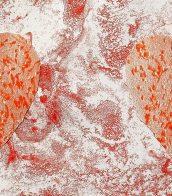

Robert Ryman was an American painter born in Nashville, Tennessee in 1930, and died in New York City in 2019. He was associated with the Minimalist movement, and is known for his monochromatic paintings that explore the materiality and texture of paint.
Ryman studied at the Tennessee Polytechnic Institute and the George Peabody College for Teachers before moving to New York City in the 1950s. He worked as a guard at the Museum of Modern Art, where he was exposed to the work of artists such as Jackson Pollock and Mark Rothko.
Ryman's early works were influenced by Abstract Expressionism, but he gradually moved towards a more minimal and reductive style. His paintings often feature white or off-white paint on square or rectangular canvases, with variations in texture and surface quality.
Ryman's work has been exhibited in galleries and museums around the world, including the Museum of Modern Art in New York, the Tate Modern in London, and the Centre Georges Pompidou in Paris. He was awarded the Golden Lion at the Venice Biennale in 2001, and is considered one of the most important American painters of the 20th century.


Robert Ryman was an American painter born in Nashville, Tennessee in 1930, and died in New York City in 2019. He was associated with the Minimalist movement, and is known for his monochromatic paintings that explore the materiality and texture of paint.
Ryman studied at the Tennessee Polytechnic Institute and the George Peabody College for Teachers before moving to New York City in the 1950s. He worked as a guard at the Museum of Modern Art, where he was exposed to the work of artists such as Jackson Pollock and Mark Rothko.
Ryman's early works were influenced by Abstract Expressionism, but he gradually moved towards a more minimal and reductive style. His paintings often feature white or off-white paint on square or rectangular canvases, with variations in texture and surface quality.
Ryman's work has been exhibited in galleries and museums around the world, including the Museum of Modern Art in New York, the Tate Modern in London, and the Centre Georges Pompidou in Paris. He was awarded the Golden Lion at the Venice Biennale in 2001, and is considered one of the most important American painters of the 20th century.


Robert Ryman was an American painter born in Nashville, Tennessee in 1930, and died in New York City in 2019. He was associated with the Minimalist movement, and is known for his monochromatic paintings that explore the materiality and texture of paint.
Ryman studied at the Tennessee Polytechnic Institute and the George Peabody College for Teachers before moving to New York City in the 1950s. He worked as a guard at the Museum of Modern Art, where he was exposed to the work of artists such as Jackson Pollock and Mark Rothko.
Ryman's early works were influenced by Abstract Expressionism, but he gradually moved towards a more minimal and reductive style. His paintings often feature white or off-white paint on square or rectangular canvases, with variations in texture and surface quality.
Ryman's work has been exhibited in galleries and museums around the world, including the Museum of Modern Art in New York, the Tate Modern in London, and the Centre Georges Pompidou in Paris. He was awarded the Golden Lion at the Venice Biennale in 2001, and is considered one of the most important American painters of the 20th century.


Robert Ryman was an American painter born in Nashville, Tennessee in 1930, and died in New York City in 2019. He was associated with the Minimalist movement, and is known for his monochromatic paintings that explore the materiality and texture of paint.
Ryman studied at the Tennessee Polytechnic Institute and the George Peabody College for Teachers before moving to New York City in the 1950s. He worked as a guard at the Museum of Modern Art, where he was exposed to the work of artists such as Jackson Pollock and Mark Rothko.
Ryman's early works were influenced by Abstract Expressionism, but he gradually moved towards a more minimal and reductive style. His paintings often feature white or off-white paint on square or rectangular canvases, with variations in texture and surface quality.
Ryman's work has been exhibited in galleries and museums around the world, including the Museum of Modern Art in New York, the Tate Modern in London, and the Centre Georges Pompidou in Paris. He was awarded the Golden Lion at the Venice Biennale in 2001, and is considered one of the most important American painters of the 20th century.
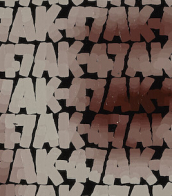

Robert Ryman was an American painter born in Nashville, Tennessee in 1930, and died in New York City in 2019. He was associated with the Minimalist movement, and is known for his monochromatic paintings that explore the materiality and texture of paint.
Ryman studied at the Tennessee Polytechnic Institute and the George Peabody College for Teachers before moving to New York City in the 1950s. He worked as a guard at the Museum of Modern Art, where he was exposed to the work of artists such as Jackson Pollock and Mark Rothko.
Ryman's early works were influenced by Abstract Expressionism, but he gradually moved towards a more minimal and reductive style. His paintings often feature white or off-white paint on square or rectangular canvases, with variations in texture and surface quality.
Ryman's work has been exhibited in galleries and museums around the world, including the Museum of Modern Art in New York, the Tate Modern in London, and the Centre Georges Pompidou in Paris. He was awarded the Golden Lion at the Venice Biennale in 2001, and is considered one of the most important American painters of the 20th century.


Robert Ryman was an American painter born in Nashville, Tennessee in 1930, and died in New York City in 2019. He was associated with the Minimalist movement, and is known for his monochromatic paintings that explore the materiality and texture of paint.
Ryman studied at the Tennessee Polytechnic Institute and the George Peabody College for Teachers before moving to New York City in the 1950s. He worked as a guard at the Museum of Modern Art, where he was exposed to the work of artists such as Jackson Pollock and Mark Rothko.
Ryman's early works were influenced by Abstract Expressionism, but he gradually moved towards a more minimal and reductive style. His paintings often feature white or off-white paint on square or rectangular canvases, with variations in texture and surface quality.
Ryman's work has been exhibited in galleries and museums around the world, including the Museum of Modern Art in New York, the Tate Modern in London, and the Centre Georges Pompidou in Paris. He was awarded the Golden Lion at the Venice Biennale in 2001, and is considered one of the most important American painters of the 20th century.
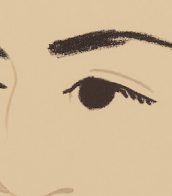

Robert Ryman was an American painter born in Nashville, Tennessee in 1930, and died in New York City in 2019. He was associated with the Minimalist movement, and is known for his monochromatic paintings that explore the materiality and texture of paint.
Ryman studied at the Tennessee Polytechnic Institute and the George Peabody College for Teachers before moving to New York City in the 1950s. He worked as a guard at the Museum of Modern Art, where he was exposed to the work of artists such as Jackson Pollock and Mark Rothko.
Ryman's early works were influenced by Abstract Expressionism, but he gradually moved towards a more minimal and reductive style. His paintings often feature white or off-white paint on square or rectangular canvases, with variations in texture and surface quality.
Ryman's work has been exhibited in galleries and museums around the world, including the Museum of Modern Art in New York, the Tate Modern in London, and the Centre Georges Pompidou in Paris. He was awarded the Golden Lion at the Venice Biennale in 2001, and is considered one of the most important American painters of the 20th century.
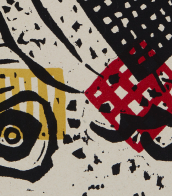

Robert Ryman was an American painter born in Nashville, Tennessee in 1930, and died in New York City in 2019. He was associated with the Minimalist movement, and is known for his monochromatic paintings that explore the materiality and texture of paint.
Ryman studied at the Tennessee Polytechnic Institute and the George Peabody College for Teachers before moving to New York City in the 1950s. He worked as a guard at the Museum of Modern Art, where he was exposed to the work of artists such as Jackson Pollock and Mark Rothko.
Ryman's early works were influenced by Abstract Expressionism, but he gradually moved towards a more minimal and reductive style. His paintings often feature white or off-white paint on square or rectangular canvases, with variations in texture and surface quality.
Ryman's work has been exhibited in galleries and museums around the world, including the Museum of Modern Art in New York, the Tate Modern in London, and the Centre Georges Pompidou in Paris. He was awarded the Golden Lion at the Venice Biennale in 2001, and is considered one of the most important American painters of the 20th century.
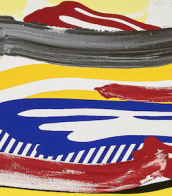

Robert Ryman was an American painter born in Nashville, Tennessee in 1930, and died in New York City in 2019. He was associated with the Minimalist movement, and is known for his monochromatic paintings that explore the materiality and texture of paint.
Ryman studied at the Tennessee Polytechnic Institute and the George Peabody College for Teachers before moving to New York City in the 1950s. He worked as a guard at the Museum of Modern Art, where he was exposed to the work of artists such as Jackson Pollock and Mark Rothko.
Ryman's early works were influenced by Abstract Expressionism, but he gradually moved towards a more minimal and reductive style. His paintings often feature white or off-white paint on square or rectangular canvases, with variations in texture and surface quality.
Ryman's work has been exhibited in galleries and museums around the world, including the Museum of Modern Art in New York, the Tate Modern in London, and the Centre Georges Pompidou in Paris. He was awarded the Golden Lion at the Venice Biennale in 2001, and is considered one of the most important American painters of the 20th century.
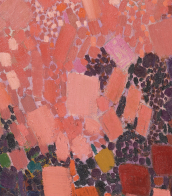

Robert Ryman was an American painter born in Nashville, Tennessee in 1930, and died in New York City in 2019. He was associated with the Minimalist movement, and is known for his monochromatic paintings that explore the materiality and texture of paint.
Ryman studied at the Tennessee Polytechnic Institute and the George Peabody College for Teachers before moving to New York City in the 1950s. He worked as a guard at the Museum of Modern Art, where he was exposed to the work of artists such as Jackson Pollock and Mark Rothko.
Ryman's early works were influenced by Abstract Expressionism, but he gradually moved towards a more minimal and reductive style. His paintings often feature white or off-white paint on square or rectangular canvases, with variations in texture and surface quality.
Ryman's work has been exhibited in galleries and museums around the world, including the Museum of Modern Art in New York, the Tate Modern in London, and the Centre Georges Pompidou in Paris. He was awarded the Golden Lion at the Venice Biennale in 2001, and is considered one of the most important American painters of the 20th century.
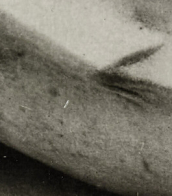

Robert Ryman was an American painter born in Nashville, Tennessee in 1930, and died in New York City in 2019. He was associated with the Minimalist movement, and is known for his monochromatic paintings that explore the materiality and texture of paint.
Ryman studied at the Tennessee Polytechnic Institute and the George Peabody College for Teachers before moving to New York City in the 1950s. He worked as a guard at the Museum of Modern Art, where he was exposed to the work of artists such as Jackson Pollock and Mark Rothko.
Ryman's early works were influenced by Abstract Expressionism, but he gradually moved towards a more minimal and reductive style. His paintings often feature white or off-white paint on square or rectangular canvases, with variations in texture and surface quality.
Ryman's work has been exhibited in galleries and museums around the world, including the Museum of Modern Art in New York, the Tate Modern in London, and the Centre Georges Pompidou in Paris. He was awarded the Golden Lion at the Venice Biennale in 2001, and is considered one of the most important American painters of the 20th century.


Robert Ryman was an American painter born in Nashville, Tennessee in 1930, and died in New York City in 2019. He was associated with the Minimalist movement, and is known for his monochromatic paintings that explore the materiality and texture of paint.
Ryman studied at the Tennessee Polytechnic Institute and the George Peabody College for Teachers before moving to New York City in the 1950s. He worked as a guard at the Museum of Modern Art, where he was exposed to the work of artists such as Jackson Pollock and Mark Rothko.
Ryman's early works were influenced by Abstract Expressionism, but he gradually moved towards a more minimal and reductive style. His paintings often feature white or off-white paint on square or rectangular canvases, with variations in texture and surface quality.
Ryman's work has been exhibited in galleries and museums around the world, including the Museum of Modern Art in New York, the Tate Modern in London, and the Centre Georges Pompidou in Paris. He was awarded the Golden Lion at the Venice Biennale in 2001, and is considered one of the most important American painters of the 20th century.


Robert Ryman was an American painter born in Nashville, Tennessee in 1930, and died in New York City in 2019. He was associated with the Minimalist movement, and is known for his monochromatic paintings that explore the materiality and texture of paint.
Ryman studied at the Tennessee Polytechnic Institute and the George Peabody College for Teachers before moving to New York City in the 1950s. He worked as a guard at the Museum of Modern Art, where he was exposed to the work of artists such as Jackson Pollock and Mark Rothko.
Ryman's early works were influenced by Abstract Expressionism, but he gradually moved towards a more minimal and reductive style. His paintings often feature white or off-white paint on square or rectangular canvases, with variations in texture and surface quality.
Ryman's work has been exhibited in galleries and museums around the world, including the Museum of Modern Art in New York, the Tate Modern in London, and the Centre Georges Pompidou in Paris. He was awarded the Golden Lion at the Venice Biennale in 2001, and is considered one of the most important American painters of the 20th century.
